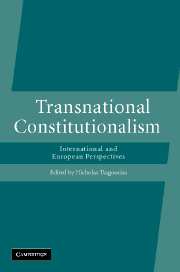Book contents
- Frontmatter
- Contents
- List of contributors
- Foreword by Malcolm D. Evans
- List of abbreviations
- Introduction – Constitutionalism: a theoretical roadmap
- Part I States, courts and constitutional principles
- 1 The rejection of the universal state
- 2 The standing of states in the European Union
- 3 The constitutional role of general principles of law in international and European jurisprudence
- 4 Proportionality and discretion in international and European law
- Part II Transnational constitutional interface
- Part III Visions of international constitutionalism
- Index
3 - The constitutional role of general principles of law in international and European jurisprudence
Published online by Cambridge University Press: 01 July 2009
- Frontmatter
- Contents
- List of contributors
- Foreword by Malcolm D. Evans
- List of abbreviations
- Introduction – Constitutionalism: a theoretical roadmap
- Part I States, courts and constitutional principles
- 1 The rejection of the universal state
- 2 The standing of states in the European Union
- 3 The constitutional role of general principles of law in international and European jurisprudence
- 4 Proportionality and discretion in international and European law
- Part II Transnational constitutional interface
- Part III Visions of international constitutionalism
- Index
Summary
Introduction
One can find in European and international legal literature many inventories or accounts of general principles of law. This is because the phrase ‘general principles of law’ has polysemous meanings and is credited with multiple roles. In this chapter, I do not offer another inventory of general principles of law or discuss the content of particular principles, but examine their role in the constitutional reading of the international and European Union political order. In other words, this chapter is a study of constitutional patterns prescribed by general principles of law. For this reason, I shall first explore typologies of such principles, and then look at how the European and international constitutional culture is defined by them. My attention will then be turned to the forces that vie to organise the international and the EU political space by focusing on the role of the International Court of Justice (ICJ) and the Court of Justice of the European Communities (European Court of Justice; ECJ) in applying or interpreting general principles of law.
Typologies of general principles of law
Traditionally, general principles of law are identified with certain principles of legal technique or logic such as the principles of estoppel, res judicata, proportionality, prescription, and so on that municipal courts or tribunals often employ in order to decide cases. These principles are then transplanted into the international or European order because of their general standing as principles of law: that is, as principles of an autonomous episteme.
- Type
- Chapter
- Information
- Transnational ConstitutionalismInternational and European Perspectives, pp. 71 - 106Publisher: Cambridge University PressPrint publication year: 2007
- 3
- Cited by

